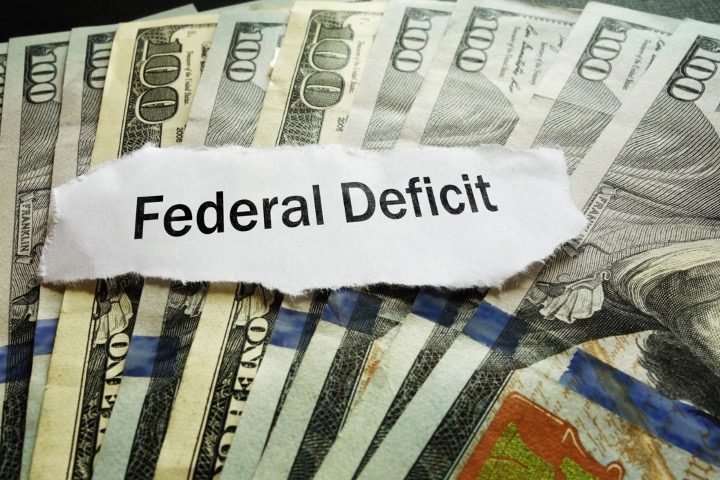
The U.S. deficit is projected to grow from $1.6 trillion in fiscal year 2024 to $2.6 trillion in 2034, according to the full 10-year baseline “Budget and Economic Outlook” report released on Wednesday by the Congressional Budget Office (CBO).
When measured in relation to gross domestic product (GDP), the deficit amounts to 5.6 percent in 2024, then hovers in the 5-percent range and reach 6.1 percent in 2034. The CBO shared that, “since the Great Depression, deficits have exceeded that level only during and shortly after World War II, the 2007-2009 financial crisis, and the coronavirus pandemic.”
Debt held by the public increases from 99 percent of GDP at the end of 2024 to 116 percent of GDP, the highest level ever recorded, by the end of 2034. And according to the Committee for a Responsible Federal Budget (CRFB), the debt in dollars is projected to grow “by $21.2 trillion over the next decade, from $27.1 trillion today to $48.3 trillion by the end of 2034.”
“Net interest costs are a major contributor to the deficit, and their growth is equal to about three-quarters of the increase in the deficit from 2024 to 2034. Initially, net interest costs are similar to the amounts of discretionary spending both for defense and for nondefense activities,” said CBO Director Phillip L. Swagel in a statement.
Outlays on mandatory programs, including Social Security, Medicare, and interest, will outpace revenue collection and reach 24.1 percent of GDP by 2034. Revenues are expected to average around 17.5 percent through 2034.
“Our debt is rising out of control, and it’s time for Congress to wake up. The outlook has improved some thanks to the bipartisan Fiscal Responsibility Act, but our fiscal situation remains precarious. The national debt will reach a new record as a share of the economy in four years, and interest costs will hit a record in just two years,” said Maya MacGuineas, president of CRFB.
The CBO projected that from 2024 to 2034, increases in mandatory spending and interest costs will outpace declines in discretionary spending and growth in revenues, driving up the debt. “Starting next year, net interest costs are greater in relation to GDP than at any point since at least 1940,” the first year the CBO reported on such data. The federal debt is forecast to reach an astounding 172 percent of GDP in 2054.
The CBO shared a bit of good news, however, stating:
The deficit for 2024 is $0.1 trillion smaller than CBO projected in May 2023, and the cumulative deficit for the 2024-2033 period is $1.4 trillion (or 7 percent) smaller.
The biggest factor contributing to smaller projected deficits is a reduction in discretionary spending stemming from the Fiscal Responsibility Act and the Further Continuing Appropriations and Other Extensions Act, 2024.
Michael A. Peterson, CEO of the Peter G. Peterson Foundation, said in a statement, “Today’s CBO projections are the latest loud and clear warning about America’s unsustainable national debt. It’s especially concerning that the Social Security trust fund will be depleted within the 10-year window, yet there is still no plan from Congress to strengthen this critical program for the future. Doing nothing to stabilize Social Security means an automatic, across-the-board cut of 23% for all beneficiaries — how can we to continue to delay solutions and risk such an unfair outcome?”
Hopefully, the CBO’s budget report will add pressure to congressional lawmakers to be fiscally responsible, cutting spending and further reducing the deficit as they seek to fund the government by early March. However, the divided Congress may just end up in a standoff over spending, leading to a forced government shutdown.
Seeking to put a positive spin on our government’s fiscal crisis, Peterson offered, “Given these challenges to our economic future, it’s encouraging to see the growing momentum for a bipartisan fiscal commission. More than 8-in-10 Americans agree that a commission would benefit our budget and economy, lower interest costs, make our tax system fairer, and strengthen key programs like Social Security. The fiscal commission legislation that recently passed the House Budget Committee with across-the-aisle support provides lawmakers a valuable opportunity to begin a process to develop the comprehensive spending and revenue solutions that are essential for our fiscal and economic future.”




